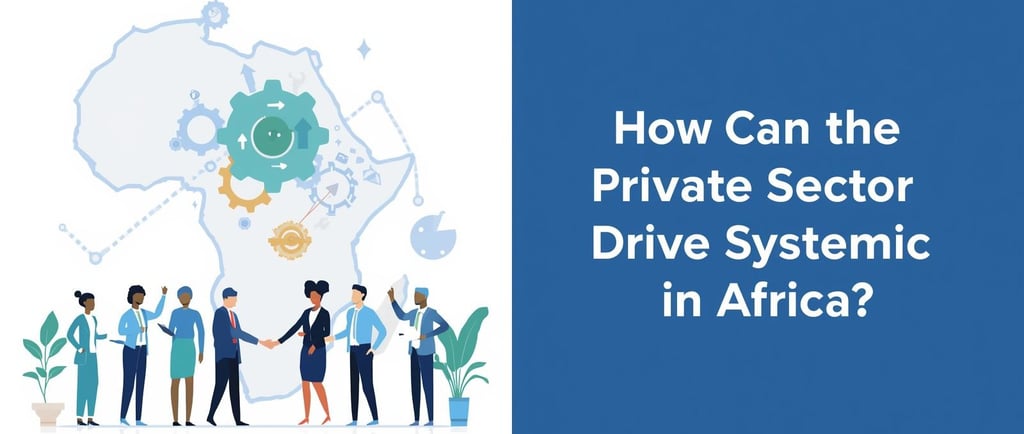How Can the Private Sector Drive Systemic Change in Africa?
The private sector is reshaping Africa’s future. This article explores how businesses drive systemic transformation through innovation, finance, and sustainability.
Helio Sixpence
9/22/20252 min read


How Can the Private Sector Drive Systemic Change in Africa?
The short answer
The private sector drives systemic change in Africa by shaping markets, creating jobs, and introducing innovations that governments and NGOs cannot deliver alone. Businesses influence entire ecosystems through supply chains, finance, and partnerships. When guided by systems thinking, companies can move beyond short-term profits to build resilience, inclusivity, and long-term impact.
The bigger picture
Africa’s development challenges — from healthcare access to climate resilience — are complex and interconnected. Traditional top-down interventions often fall short because they don’t address the entire system. This is where the private sector matters. Companies, from multinationals to local SMEs, hold the power to scale solutions, mobilize investment, and influence consumer behavior.
For example, fintech companies in Kenya didn’t just create a new payment method; they reshaped the financial system, bringing millions into the formal economy. Likewise, agribusinesses adopting sustainable sourcing can uplift farmers, improve food security, and reduce environmental stress — all at once.
Why systems thinking matters for business
Systemic change happens when businesses stop seeing their role as isolated. A supply chain decision, a hiring policy, or a product launch all ripple across communities, economies, and ecosystems. By adopting systems thinking, private firms can:
Anticipate long-term risks like climate shocks or political instability.
Align with local priorities to ensure solutions fit real needs.
Build partnerships that strengthen entire sectors rather than competing in silos.
This perspective helps companies remain resilient and relevant while contributing to broader societal goals.
Challenges and opportunities
The private sector’s influence is undeniable, but systemic change requires more than market power. Short-term profit motives, weak governance, and fragmented regulation often limit impact. However, momentum is building:
Impact investors are channeling billions into African startups with social missions.
Regional trade agreements are opening markets for cross-border innovation.
Consumer demand for ethical and sustainable practices is pushing companies to adapt.
The opportunity lies in aligning business incentives with long-term development outcomes.
Conclusion: A shared responsibility
The private sector is not a substitute for governments or civil society, but a vital partner in systemic change. By leveraging innovation, finance, and scale, companies can help Africa move from isolated projects to transformative progress.
At Elyon Holding, we believe the key is Adaptive Stability: keeping values consistent while strategies evolve. When businesses embrace this balance, they don’t just survive in uncertain markets — they lead lasting change.
FAQs
Q1: What is systemic change in development?
It refers to shifts that transform entire systems — not just individual projects — by addressing root causes and interconnections.
Q2: Why is the private sector important for systemic change?
Because businesses control resources, markets, and innovation that can influence entire ecosystems.
Q3: Can small businesses contribute to systemic change?
Yes. SMEs often drive local employment, build community resilience, and adapt solutions to local contexts.
Q4: How can companies apply systems thinking?
By considering how decisions affect wider stakeholders, building partnerships, and aligning profit with long-term sustainability.
